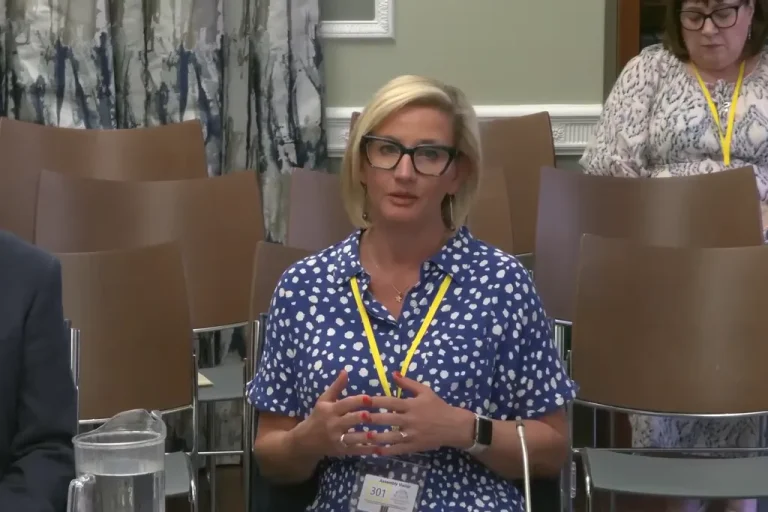The lack of nurse provision in some special schools in Northern Ireland is “not sustainable”, a cross-party committee has been told.
This week, Northern Ireland’s Committee for Education was warned of ongoing fears around inadequate nursing provision in the country’s schools for children with special education needs (SEN).
“It is a daily struggle for us in our schools to meet safely the complex medical needs of the children”
Roz McFeeters
It comes as the medical needs of many pupils in special schools is becoming increasingly complex, with some classroom assistants being delegated duties that should be performed by nurses, members of the legislative assembly (MLAs) were told.
Northern Ireland’s chief nursing officer, Maria McIlgorm, has commissioned the Public Health Agency (PHA) to undertake a review of nursing provision in special schools, due to report to the government by the end of May.
It followed concerns raised that some special schools were potentially going to lose their nursing provision, while others already had none.
The Department of Health in Northern Ireland said it was committed to ensuring all children were supported by an appropriate member of the multidisciplinary team to meet their healthcare needs.
This week, Stormont’s education committee heard evidence on SEN from the chair and vice chair of the Special School Strategic Leadership Group, which represents principals from Northern Ireland’s special schools.
Vice chair of the group and principal of Hill Croft School, Roz McFeeters, told the committee that her school had been “crying out for a nurse” for many years.
She argued that the current resources available at the school were “not sustainable” to look after pupils in the longer term.
“It is a daily struggle for us in our schools to meet safely the complex medical needs of the children in our schools, that it really cannot be underestimated,” she said.
Ms McFeeters’ school, based in Newtownabbey, County Antrim, has had to delegate nursing tasks to other members of staff due to the lack of nurse provision.
She said: “As a school at the moment, I have 38 different delegated nursing tasks that are going on, and 24 of the 22 classes have young people who require medical interventions on a daily basis.
“I have wonderful staff who give and give and give, but there is a disparity as well, even in the roles that those staff are playing across the schools.”
Ms McFeeters said she was looking forward to hearing the outcome of the PHA review and “what actions will be agreed and be taken”.
“Some schools are left carrying unacceptably high levels of risk for the children in their care”
Nick Mathison
“We feel that the need for multidisciplinary, multi-agency and multi-departmental working is absolutely essential for us to be able to meet the needs of these young people,” she said.
Meanwhile, chair of the Special School Strategic Leadership Group, Colin Ward, told the committee that he was “very fortunate” at Parkview Special School in Lisburn to have a nurse employed.
He too warned that, because of the “complex nature of the needs of pupils”, it would not be sustainable for schools to manage the medical needs of children safely and effectively without nurses.
Mr Ward argued that it was already “extremely difficult to do that with a nurse on site” so without a nurse, it would be worse.
Following the meeting, chair of the Committee for Education and MLA for Strangford, Nick Mathison, said nursing provision in special schools was “essential”.
Mr Mathison said he was made aware of plans to remove nursing support from special schools in the South Eastern Health and Social Care Trust area over a year ago and had been lobbying his executive colleagues on the issue.
He said: “Up until late last year, the concerns of principals had not been acted upon, and only when I convened a joint meeting with the health and education ministers was a review announced.
“Perhaps even more worryingly, in some trust areas there is no nursing provision at all, meaning some schools are left carrying unacceptably high levels of risk for the children in their care.”
Mr Mathison said any suggestion that other SEN school staff, including classroom assistants, could “take over duties” from nurses was “simply unfair”.
“Assistants go above and beyond their duties to look after these children but ultimately are not clinically trained to manage this level of complexity,” he said.
“Whilst it’s welcome that a review into nursing provision in special schools is now underway, it remains unclear if the health minister will even consider reinstating nursing provision in all special schools as an option when it concludes.
“Nursing provision can be lifesaving, and it must be reinstated in all special schools that require it as soon as possible.”
A spokesperson for the Department of Health told Nursing Times that the health minister was “committed” to working with the education minister “to ensure that children with additional healthcare needs can safely be supported to attend school and be enabled to achieve their full potential”.
They said the PHA review would “undertake a comprehensive needs assessment to scope the complex healthcare needs of children attending schools”.
“Our priority remains to ensure that all children have safe access to education, supported by the appropriate member of the multidisciplinary team – including nursing – to meet their healthcare needs,” said the spokesperson.
They said that the final report would be delivered by the PHA to the health minister for consideration by the end of May.

